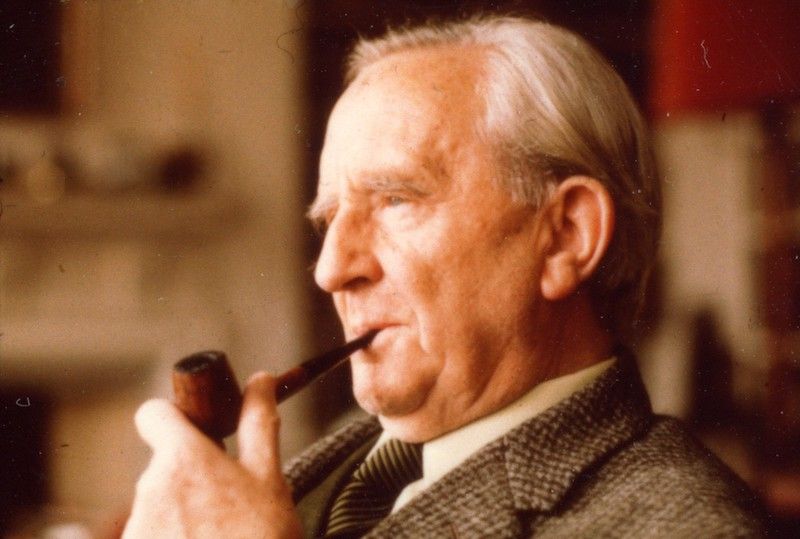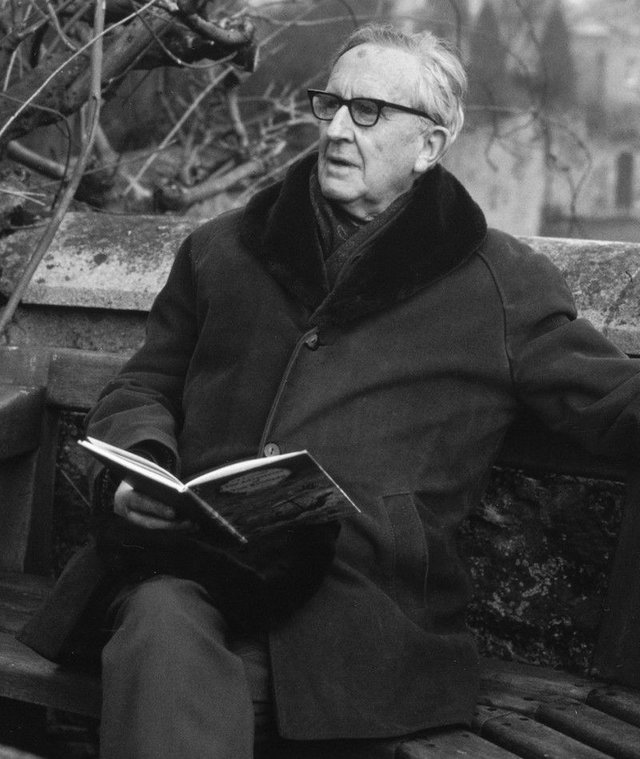I would like to talk about the book by Humphrey Carpenter "J. R. R. Tolkien: A Biography" - a classic account of the life of a famous person. With dignity, shortly enough, adhering to the main biographical canvas, tells about the author of books that we love so much.
Beginning to talk about something connected with Tolkien, I risk being "cast down rotten tomatoes" and I would be afraid to talk about the book if, firstly, I would not read it, and secondly, the book would not liked.

Carpenter in this book quotes Tolkien's words (approximate English translation):
"I'm absolutely sure that studying the author's biography in order to understand his writings is nothing."
Not only is it empty, it's also not a safe thing, because there are so many moments when one wants to attribute this or that biographical event to decisive importance in the creation of some literary works. With Tolkien - this is especially important.
What you should know about the author of "The Lord of the Rings" first of all, is that he was a deeply religious Christian. And if one does not know this fact, then his books are perceived differently, and one must necessarily relate his perception of his work to this fact. So that we do not think about this amazing fairy tale, because it is not just a fairy tale in itself, it is a genre-making thing.
There were fairy-tale novels and up to Tolkien, they will be many hundreds of years after him, but what the Lord of the Rings did that started in the grain, in the bud in the Hobbit, gradually growing up to this saga, can not be repeated to anyone. He was able to create for the first time with the force and persuasiveness of the artistic embodiment - a fairy world based on a mass of sources, about which hundreds, maybe thousands, of scientific works have already been written.
First of all, Tolkien was a teacher of classical English literature and he taught this literature like no other. He could for years, painstakingly prepare for the publication of the translation, he was a classical philologist in the best sense of the word. Tolkien knew languages and not just languages, but their history. Linguistics, historical and comparative - it was one of his skates. And when he invented fictitious languages for his stories, he certainly relied on the experience of a scientist, a real, serious researcher. This is what Carpenter talks about in his book.

When I say that no one can repeat the "The Lord of the Rings", I mean that the book is of exceptional importance for the history of literature. You may not like the fairy tales of this genre, you can not read literature of this kind, you can generally relate to genre literature, whatever you disapprove, but any educated person is obligated to read "The Lord of the Rings". Do you want, do not want to enjoy the detailed description of the history of the dwarves or elven legends, you understand how important it is for the entire English-language literature or do not understand - it does not matter, in any case, this tale needs to be mastered. Anyone who is interested in the book and loving the word must necessarily get acquainted with these images in the original source, in the "Lord of the Rings", and not having looked at the cinema and without reading the "Hobbit". Any reader should first become acquainted with the "The Lord of the Rings".
When you read, for example, in the biography of Clive Lewis, a close friend of Tolkien, that he spent some time in his country house with his relatives when he was a child. Where he could meet, and with the forest, and with the hills, and where with other children they lived in nature, far enough from London where they bombed. Already immediately and clearly traced how to get his stories about "Narnia", and these images find their own biographical background. With Tolkien not quite so, he was mainly engaged in his professional activities.
For example, I was amazed that he was very fond of his wife, lived with her for many years in the world, they managed, if not make a mistake, a golden wedding. But the office and studies he conducted were moved to a garage converted for this purpose, where he met with the journalists where his manuscripts were stored, where on the wall hung the map of Middle-earth, where his typewriter was. This little nuance, but this means a lot to me.
And I want to say that Tolkien, as a person, primarily personifies the ideal of an English intellectual, a man who never interfered in what he did not understand, and who spent thousands of hours in correspondence with correspondents from America, England, publishers, editors, defending or explaining some aspects that he considered the most important, whether using a fictitious language or a detail of the history of a fictional world.
And when you read these documents that have already become historical, this correspondence, memories, you understand that on paper, in words, the line between the invented and the real simply did not exist. Of course, it was absolutely real man, there can be no question that Tolkien confused imagination and reality, he created the world, but always remained an English professor without any quirks. But, I repeat, the book is written tactfully, calmly, without excitement.
At the end of life Tolkien received a large income from his literary works, but we should not exaggerate it. There is no need to think that the book, influenced by the whole world and read by millions, was just as popular in those years. She was insanely popular, but not so much. And many of Tolkien's colleagues for many years did not correlate with his literary success, and his name was a teacher, that is, it was not so significant in appearance.

But when you read pages devoted to personal life, the pages devoted to its relationship with friends, family, you understand that inside the biography, in a "closed tightly-seated room", the value is difficult even to overestimate. He was constantly in the creative transformation of this fictional world. According to the drafts that we have available, according to the "Hobbit" available to us, which is a preliminary exposition of the future history, we can see how, for decades, the very idea of this fictional world has gradually crystallized. As the study of ancient languages leads to linguistic fantasies, which gradually grow into the reconstruction of history from several dialects of a non-existent language.
Carpenter's book is a simple and accessible way to learn more about your favorite writer. Surprisingly discovering that this is a standard life, a standard professor who did not have any exceptional events all along. Life, in something exemplary, in some ways ordinary. But when you read "J. R. R. Tolkien: A Biography" to the end, you will feel the deepest respect.
Tolkien could spend his entire life at the same time in these two worlds: in real, about which we all know and in that fictional world, where thanks to the efforts of biographers we can understand how they are connected. And they are related only by one - the writer's personality. This is, of course, the greatest miracle, to observe which gives great pleasure. About how a living, understandable and in many ways ordinary man, connects the unconnected by the power of his talent, connects the real world and the world of his imagination. It's an amazing thing and it's already somewhat philosophical.
I'm sure that Tolkien is the writer whose biography must be known.
@originalworks
Downvoting a post can decrease pending rewards and make it less visible. Common reasons:
Submit
This post has received a 3.13 % upvote from @drotto thanks to: @bramin.
Downvoting a post can decrease pending rewards and make it less visible. Common reasons:
Submit
This post has received a 18.16% upvote from @lovejuice thanks to @bramin. They love you, so does Aggroed. Please be sure to vote for Witnesses at https://steemit.com/~witnesses.
Downvoting a post can decrease pending rewards and make it less visible. Common reasons:
Submit
This post has received a 9.38 % upvote from @steemthat thanks to: @bramin. Thank you for your support. Stay Updated And Use Cool Tools At SteemThat.com Want Some Steemish Built On Ethereum? Get You Some!
Downvoting a post can decrease pending rewards and make it less visible. Common reasons:
Submit
@echosupport swimming by to drop off your vote , @journeyoflife is giving you a free vote as well.
Downvoting a post can decrease pending rewards and make it less visible. Common reasons:
Submit
Enjoy the free upvote !
Downvoting a post can decrease pending rewards and make it less visible. Common reasons:
Submit